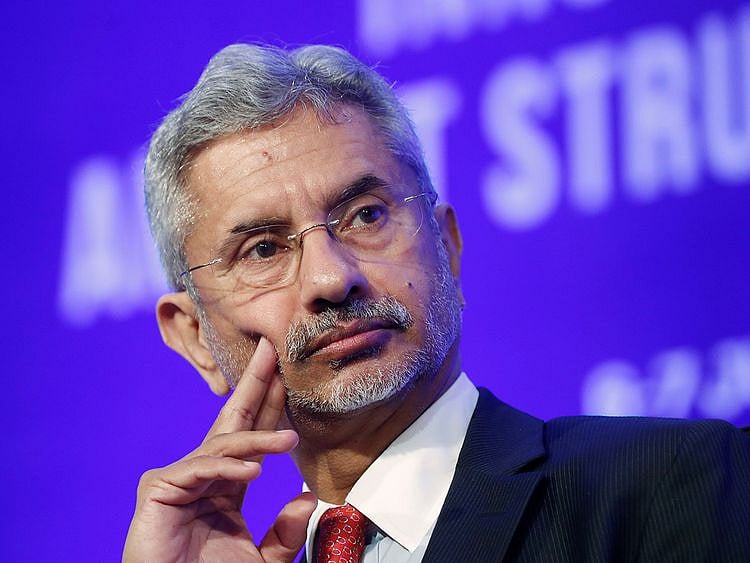Also In This Package
Oxygen aid arrives in India as death toll hits new high
Photos: India’s COVID-19 cases cross 20 million
Meet Adline Castelino, India’s Miss Universe contestant
See: India braces for powerful cyclone amid virus surge
Photos: Aid pours in for COVID-19-hit India
India expands vaccine drive despite chronic shortage
India’s Minister of External Affairs S Jaishankar’s visit to America is the first high-level bilateral diplomatic visit by a top Indian dignitary after Joe Biden was inaugurated as the President of the United States.
This is also India’s first close political encounter with a post-Trump Washington. The visit is taking place under the shadow of a global pandemic.
Bilateral and multi-lateral collaborations on COVID-19 vaccines and building up of the global health infrastructure is among the key topics coming up for discussion between the two nations during Jaishankar's five day visit.
However, experts have expressed curiosity about Jaishankar’s sudden trip to the US. What was the urgency, many ask, of a physical visit in the middle of COVID-19 crisis in India (when official deliberations can be held online) unless there is something more to it?
The Foreign Minister, who enjoys the trust of Indian Prime Minister Narendra Modi, has preferred to make an air-dash to the US also suggests that there is more to it than meets the eye. It’s possible that the first rough draft of the Indo-US relations trajectory under Biden administration on climate change, multilateralism and trade will shape up.
Wide-ranging issues
Highly placed sources in the External Affairs ministry told Gulf News that Jaishankar’s visit is going to be political in nature, not just commercial. The Foreign Minister will hold bilateral meeting with US Secretary of State Antony Blinken on wide-ranging issues.
Professor Rajesh Rajagopalan, who teaches international affairs at JNU told Gulf News, “This visit is not all about the vaccines. It is not even about the Af-Pak strategy. It’s more about the Indo-Pacific ties and the Quad. My general sense is that the military, diplomatic and other policies shall be co-ordinated more and more.”
On the issue of Af-Pak, India and the US do not have much of a common ground. In addition, not much time is left for all American troops to exit Afghanistan. The fall-out of the US pull-out by September 2021 will necessitate India to expand its options in Kabul.
Global health infrastructure is another issue that will dominate Jaishankar’s agenda in the US. Already, discussion has taken place amongst US, EU and India to join hands to combat COVID-19. In its effort to tackle the virus, India expects a substantial change on ground in the country by January 2022.
Another top issue on the Jaishankar’s agenda is the matters at United Nations Security Council (UNSC). India is now a non-permanent member of the UNSC. Jaishankar will meet Secretary General Antonio Guterres to discuss several issues.
In this chock-a-block schedule, the vaccines related issues are going to take lot of time, energy and persuasion. India wants a smooth supply of raw materials for the Oxford AstraZeneca/Covishield vaccine and also wants to talk to Johnson & Johnson for the joint production of the vaccine.
Complex global supply chain
The most important thing about the vaccines is that there is a global supply chain and it involves several countries. The thing that many in India don’t acknowledge enough is that merely asking drug czars and the US to put on hold Intellectual Property Rights (IPR) of vaccines isn’t enough. India and South Africa has put up the demand at WTO to put the COVID-19 vaccines patent on hold.
Unless all countries co-operate within a fixed period to supply raw materials, even the huge step of suspension of IPR means nothing. American system is no less complex when it comes to export of important raw materials. Even in a rarest of rare decision, America suspends the application of the IPR then it will require lifting export embargoes by an executive decision.
Pfizer’s COVID-19 vaccine, for instance, approximately depends on 280 ingredients and components. There are some 86 suppliers in 19 countries.
Also, the Indian-made vaccine is no different. It requires 360 ingredients from 10 countries. Over 200 of these are from the United States and more than 100 from Germany, alone. Singapore, Denmark, Poland and Japan also supply few crucial materials.
An informed source in the government said, “The vaccine demand has grown from zero to two billion plus in our country. If just one country shuts down raw material production, the entire supply chain breaks down.”
Export-restrictions on vaccines
Many countries including the US have put export-restrictions because they want to ensure and prioritise domestic vaccination. In India, lots of debates have taken place to allow the licences to make vaccines.
As such, it means nothing unless the complete global supply chain that provides ingredients come together to facilitate India to manufacture vaccines in India for Indians and the world market.
Jaishankar will have tough time negotiating the entire gamut of issues involved in making of the vaccines and supplies of the raw materials available to India.
India is presently manufacturing Covishield, Covaxin and Russian Sputnik. All three vaccines need raw materials from abroad and mainly American suppliers are involved.
The complexities of the global network of vaccines explains how Jaishankar’s visit to America comes at a crucial junction when Indian economy is unstable and millions of the Indian families are grieving due the sudden and intense assault of the coronavirus.
The success of this visit and the collaboration between two of the world’s most important democracies will go a long way in overcoming the challenge posed by the pandemic.
Network Links
GN StoreDownload our app
© Al Nisr Publishing LLC 2026. All rights reserved.
